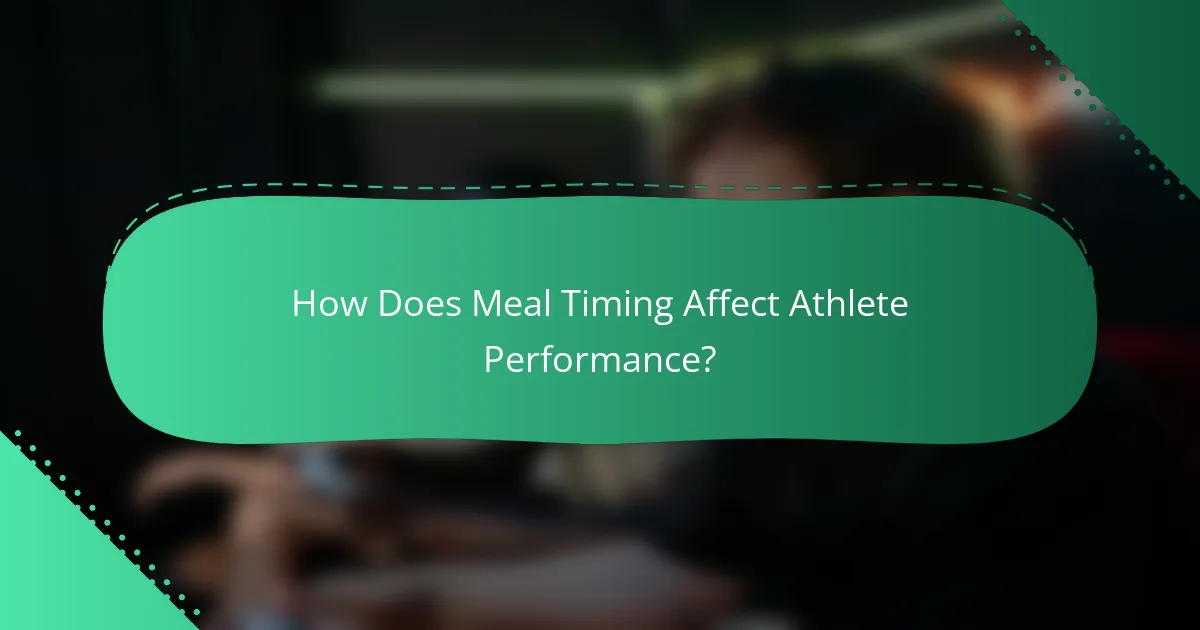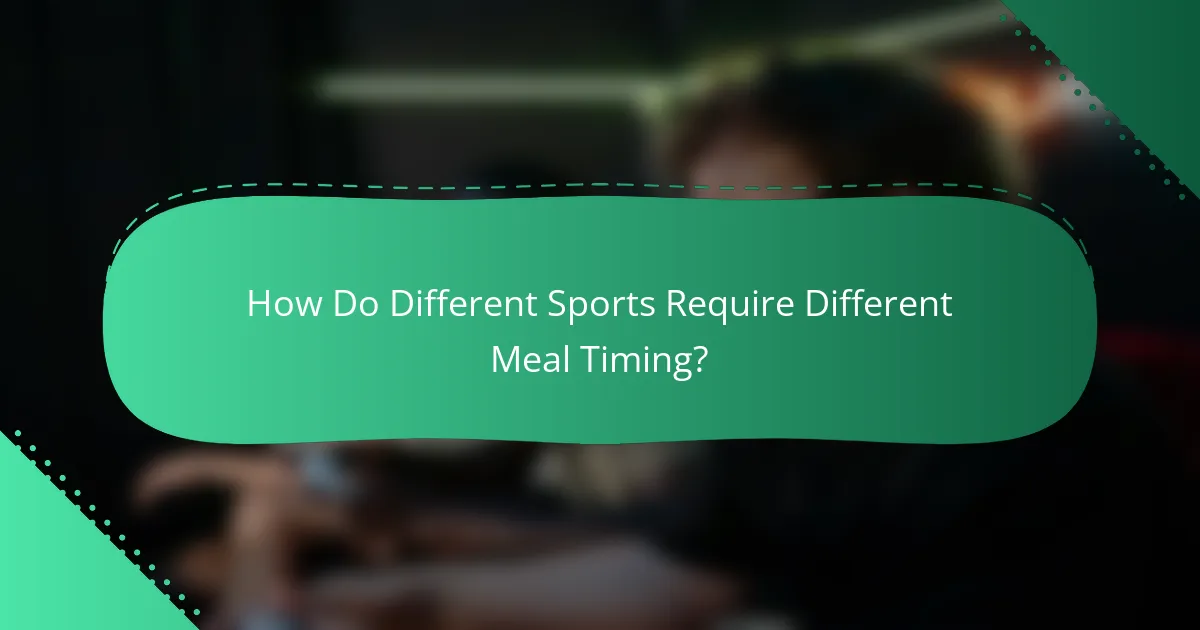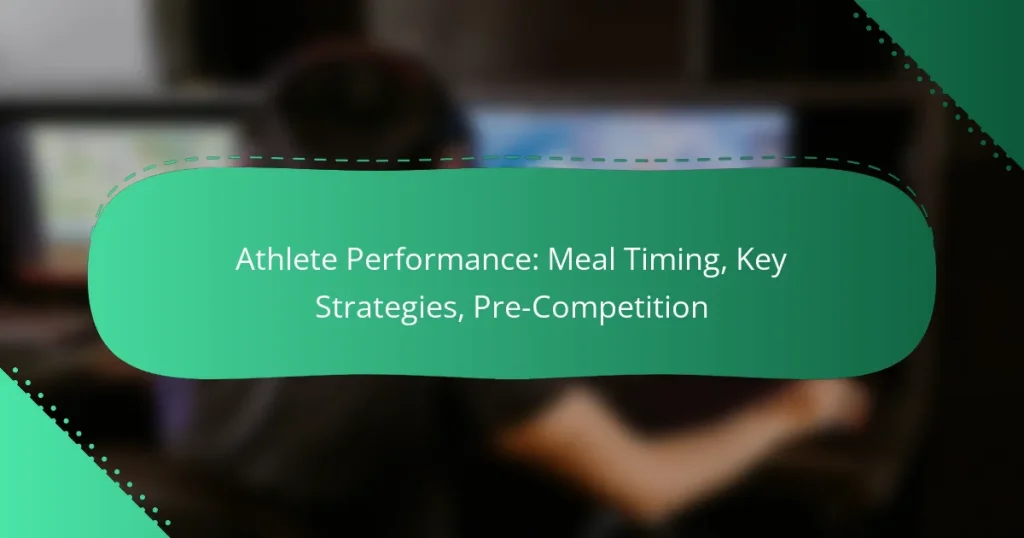Meal timing plays a crucial role in athlete performance by affecting energy availability, recovery, and nutrient absorption. By strategically planning meals around training and competition, athletes can enhance their energy levels and optimize their overall performance. A well-timed pre-competition meal, consisting of easily digestible foods, is essential for maximizing energy and maintaining hydration.

How Does Meal Timing Affect Athlete Performance?
Meal timing significantly impacts athlete performance by influencing energy availability, recovery, and nutrient absorption. Properly timed meals can enhance overall athletic output and improve training results.
Optimizes energy levels
Eating at the right times helps maintain optimal energy levels during training and competition. Athletes should aim to consume a balanced meal containing carbohydrates and proteins about 3-4 hours before an event to ensure adequate energy stores.
For quick energy, a small snack rich in carbohydrates can be consumed 30-60 minutes prior to activity. Foods like bananas or energy bars are ideal for this purpose, providing easily digestible fuel without causing gastrointestinal discomfort.
Enhances recovery
Meal timing plays a crucial role in recovery post-exercise. Consuming a meal or snack containing protein and carbohydrates within 30-60 minutes after training can significantly enhance muscle repair and glycogen replenishment.
For example, a protein shake with a banana or a turkey sandwich can effectively support recovery. This timing helps to capitalize on the body’s heightened insulin sensitivity, allowing for better nutrient uptake.
Improves nutrient absorption
Strategic meal timing can enhance nutrient absorption, which is vital for athletic performance. Consuming meals at regular intervals throughout the day ensures a steady supply of nutrients, helping to prevent deficiencies that could impair performance.
Aim for balanced meals every 3-4 hours, incorporating a mix of macronutrients. This approach not only supports energy levels but also maximizes the body’s ability to absorb vitamins and minerals necessary for optimal function.

What Are Key Meal Timing Strategies for Athletes?
Key meal timing strategies for athletes focus on optimizing performance and recovery through well-planned nutrition schedules. By strategically timing meals around workouts, athletes can enhance energy levels, improve recovery, and support overall performance goals.
Pre-workout nutrition
Pre-workout nutrition is crucial for fueling exercise and maximizing performance. Athletes should aim to consume a balanced meal or snack containing carbohydrates and protein about 1-3 hours before training. This timing allows for optimal digestion and energy availability.
Examples of effective pre-workout foods include oatmeal with fruit, a smoothie with protein powder, or a banana with nut butter. These options provide the necessary energy without causing discomfort during exercise.
Post-workout recovery meals
Post-workout recovery meals are essential for replenishing glycogen stores and repairing muscle tissue. Athletes should consume a meal rich in carbohydrates and protein within 30-60 minutes after exercising to maximize recovery benefits.
Good post-workout options include grilled chicken with quinoa and vegetables, a protein shake with a banana, or yogurt with granola. These meals help restore energy levels and support muscle repair, which is vital for ongoing training and performance.
Daily meal frequency
Daily meal frequency plays a significant role in maintaining energy levels and supporting recovery for athletes. Eating smaller, balanced meals every 3-4 hours can help sustain energy and prevent fatigue throughout the day.
It’s beneficial to include a variety of foods in each meal, such as lean proteins, whole grains, healthy fats, and plenty of fruits and vegetables. This approach ensures a steady supply of nutrients and energy, which is crucial for optimal athletic performance.

What Should Athletes Eat Before Competition?
Athletes should focus on consuming easily digestible foods that provide energy and hydration before competition. The right pre-competition meal can enhance performance by optimizing energy levels and maintaining hydration.
Carbohydrate-rich foods
Carbohydrate-rich foods are essential for athletes before competition as they provide the necessary energy for optimal performance. Foods such as pasta, rice, bread, and fruits like bananas are excellent choices. Aim for a meal that includes 1-3 grams of carbohydrates per kilogram of body weight about 3-4 hours before the event.
Incorporating simple carbohydrates, like sports drinks or energy gels, can be beneficial if consumed closer to the competition, typically 30-60 minutes prior. These options are quickly absorbed and can help maintain energy levels during the event.
Hydration strategies
Staying hydrated is crucial for athletes prior to competition. It is recommended to drink water or electrolyte-rich beverages in the hours leading up to the event. Aim for about 500-600 mL of fluid 2-3 hours before competing, and an additional 200-300 mL about 20-30 minutes prior.
Monitor urine color as a simple gauge of hydration; pale yellow indicates adequate hydration, while darker shades suggest a need for more fluids. Avoid excessive caffeine or alcohol, as these can lead to dehydration.
Timing of pre-competition meals
The timing of pre-competition meals significantly impacts performance. A substantial meal should be consumed 3-4 hours before the event, allowing for proper digestion. This meal should focus on carbohydrates, moderate protein, and low fat to avoid gastrointestinal discomfort.
If time is limited, a smaller snack can be eaten 30-60 minutes before competition, focusing on easily digestible carbohydrates. Examples include a piece of fruit or a small energy bar. Avoid heavy or rich foods close to competition to prevent sluggishness or digestive issues.

How Can Meal Timing Improve Endurance?
Meal timing can significantly enhance endurance by optimizing glycogen stores and ensuring that energy levels are sustained during prolonged physical activity. Properly timed meals help athletes maintain performance and delay fatigue, allowing for better training outcomes.
Glycogen storage techniques
To maximize glycogen storage, athletes should focus on carbohydrate intake, especially in the days leading up to an endurance event. Consuming a diet rich in complex carbohydrates, such as whole grains, fruits, and vegetables, can help increase glycogen reserves. Aim for about 7-10 grams of carbohydrates per kilogram of body weight in the days before competition.
Additionally, incorporating carbohydrate-rich snacks immediately after training can enhance glycogen replenishment. Consuming 1-1.5 grams of carbohydrates per kilogram of body weight within 30 minutes post-exercise is a practical guideline to follow.
Meal timing for long training sessions
For long training sessions, it’s crucial to time meals strategically. A meal containing carbohydrates and protein should be consumed 3-4 hours before training to ensure adequate energy levels. This meal should be balanced, consisting of around 60-70% carbohydrates, 15-20% protein, and minimal fats.
During extended workouts lasting over 90 minutes, athletes should consider consuming quick-digesting carbohydrates, such as sports drinks or gels, every 30-45 minutes to maintain energy. This approach helps prevent glycogen depletion and supports sustained performance throughout the session.

What Are the Benefits of Nutrient Timing?
Nutrient timing refers to the strategic consumption of food and supplements around training and competition to optimize performance and recovery. By aligning nutrient intake with physical activity, athletes can enhance muscle recovery and improve overall performance metrics.
Enhanced muscle recovery
Proper nutrient timing can significantly enhance muscle recovery by ensuring that the body receives essential nutrients when they are most needed. Consuming protein and carbohydrates shortly after exercise helps replenish glycogen stores and repair muscle tissue, which can lead to faster recovery times.
Aim to consume a meal or snack containing both protein and carbohydrates within 30 to 60 minutes post-exercise. This could be a protein shake with a banana or a chicken sandwich, depending on personal preference and dietary needs.
Improved performance metrics
Nutrient timing can lead to improved performance metrics by optimizing energy availability during training and competition. Consuming carbohydrates before a workout can enhance endurance and strength, allowing athletes to perform at their best.
Consider eating a carbohydrate-rich meal 3 to 4 hours before an event, such as oatmeal with fruit or a pasta dish. This ensures that energy levels are high, which can translate into better results in terms of speed, strength, and overall performance.

What Factors Influence Meal Timing Decisions?
Meal timing decisions for athletes are influenced by several key factors, including the type of sport, individual metabolic rates, and training schedules. Understanding these elements can help optimize performance and recovery.
Type of sport
The type of sport plays a crucial role in determining meal timing. Endurance athletes, for example, may benefit from consuming carbohydrates shortly before and during events to maintain energy levels. In contrast, strength athletes might focus on protein intake after workouts to support muscle recovery and growth.
Different sports also have varying energy demands, which can dictate when meals should be consumed. For instance, sports with intermittent bursts of activity, like soccer or basketball, may require athletes to eat closer to competition time to ensure adequate energy availability.
Individual metabolic rates
Individual metabolic rates significantly affect meal timing decisions. Athletes with faster metabolisms may require more frequent meals to sustain energy levels, while those with slower rates might find that fewer, larger meals suffice. It’s essential for athletes to monitor their energy needs and adjust meal timing accordingly.
Additionally, personal preferences and how one feels after eating can influence timing. Some athletes may perform better with a light meal or snack shortly before competition, while others may need a longer digestion period to avoid discomfort.
Training schedules
Training schedules dictate when athletes should eat to maximize performance and recovery. Athletes training multiple times a day may need to space their meals and snacks to ensure they have sufficient energy for each session. A common strategy is to consume a balanced meal 2-3 hours before training and a recovery snack within 30 minutes post-workout.
It’s also important to consider the timing of meals around high-intensity training sessions. Consuming carbohydrates before and after workouts can help replenish glycogen stores, while protein intake post-training supports muscle repair. Athletes should tailor their meal timing to align with their specific training demands and recovery needs.

How Do Different Sports Require Different Meal Timing?
Meal timing varies significantly across different sports due to the unique energy demands and physiological responses required for each activity. Athletes must tailor their nutrition strategies to optimize performance based on the specific timing and intensity of their sport.
Endurance Sports
Endurance sports, such as marathon running and cycling, require careful meal timing to maintain energy levels over extended periods. Athletes should consume a carbohydrate-rich meal about 3-4 hours before an event to ensure glycogen stores are maximized. Additionally, a small snack 30-60 minutes prior can provide a quick energy boost.
During long events, athletes often benefit from consuming easily digestible carbohydrates, such as gels or sports drinks, every 30-45 minutes to sustain energy levels. Hydration is equally critical, with water or electrolyte drinks consumed regularly throughout the event.
Strength Sports
In strength sports like weightlifting and powerlifting, meal timing focuses on muscle recovery and energy replenishment. Athletes should aim for a balanced meal containing protein and carbohydrates about 2-3 hours before training or competition. This timing helps optimize performance and supports muscle repair.
Post-exercise nutrition is crucial as well; consuming protein-rich foods or shakes within 30 minutes after a workout can enhance recovery. A common strategy is to consume a meal or snack that includes both protein and carbohydrates to replenish glycogen stores and promote muscle synthesis.
Team Sports
Team sports, such as soccer and basketball, require a flexible approach to meal timing due to the dynamic nature of games. Athletes should eat a well-balanced meal 3-4 hours before a match, focusing on carbohydrates for energy and protein for muscle support. A light snack 30-60 minutes prior can help maintain energy levels without causing discomfort.
During games, hydration is vital, and athletes should drink water or sports drinks at regular intervals. Consuming quick-digesting carbohydrates, like fruit or energy bars, during breaks can help sustain performance throughout the match.


